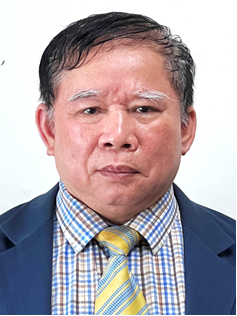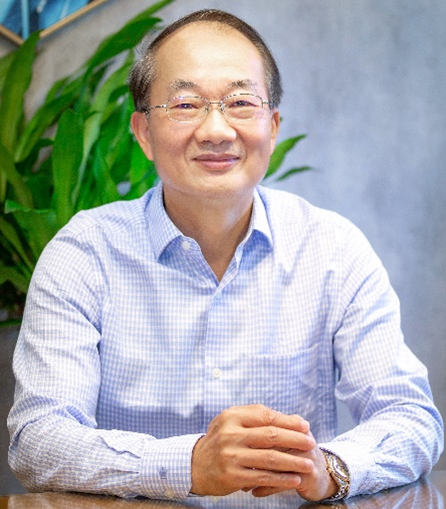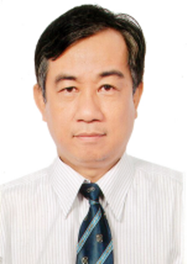
| Title/fullname: Prof.
Dr.Sc. BUI VAN GA
Recent Position: General
Editor, Journal of Science and Technology-The University of Danang
Scholar: https://scholar.google.com/citations?user=S3vZ_o8AAAAJ&hl=en
Biography:
Professor BUI Van
Ga, General Editor of the Journal Science and Technology-the University of
Danang (JST-UD). He was Vice Minister, Ministry of Education and Training of
Vietnam (2010-2017). Before being Vice Minister, he was President of the
University of Danang (2005-2010), Rector of Danang University of Science and
Technology (2004-2005), Director of the Danang University Institute of
Technology (2000-2004), Director of the Research Center for Environmental
Protection of the University of Danang. He was visiting professor at IUT1,
Joseph Fourier University, IUT of Angers, University of Nice Sophia Antipolis
(France).
He has been research
team leader of several projects funded by international organizations such as
AUF (French Speaking Universities), CIDA (Canadian Agent for International
Development)…He was distinguished by “Prix Scientifique de la Francophonie”
2003; First Prize for Scientific Research of the City of Danang 2003; Doctor
Honoris Causa of the University of Nantes.
He received Doctor of Science degree (1994), Doctor of
the École Centrale de Lyon (1989), Engineer in Mechanics of Danang University
of Science and Technology (1980). He
is the author of 9 patents, more than 250 publications, 10 books; director of
23 PhD thesis. His research is in the field of Fluid Mechanics, Combustion, Pollution, Renewable Energies, Renewable fuels, Hybrid renewable power generation system. |
Title:
Future Prospects of Hydrogen as a Sustainable Fuel in the Automotive Industry
Abstract: In
practice, no single renewable fuel can completely replace fossil fuels. Among
renewable options, hydrogen is considered the most sustainable long-term fuel
because it can be produced using solar energy and water. In a future
hydrogen-based economy, hydrogen will be a primary energy source, especially in
the transportation sector. There has been considerable debate over whether the
future automobile market will be dominated by Battery Electric Vehicles (BEVs)
or Fuel Cell Electric Vehicles (FCEVs). It is likely that both types of
vehicles will coexist. FCEVs offer several advantages over BEVs, including
lower greenhouse gas (GHG) emissions throughout their lifecycle, higher energy
storage density, shorter refueling times, and longer cruising ranges. The
efficiency of hydrogen fuel cells is more than double that of hydrogen internal
combustion engines. The cost of hydrogen fuel cells continues to decrease due
to advancements in manufacturing technology and the application of new
materials. Given the low levels of GHG emissions throughout the lifecycle of
FCEVs, it is anticipated that FCEVs may dominate the automobile market in the
latter half of this century, as progress is made towards a hydrogen-based
economy. However, the primary challenge in hydrogen application for automobiles
is onboard hydrogen storage. Hydrogen's low volumetric energy density
necessitates oversized storage tanks to ensure an acceptable cruising range.
Material-based hydrogen storage technology provides high energy density with
moderate operating pressure and temperature, making it suitable for hydrogen
fuel cell automotive applications. Swapping hydrogen canisters is a viable
solution for supplying hydrogen to hydrogen fuel cell motorcycles. Onboard
hydrogen conversion from hydrogen-containing fuels may provide a long-term
solution to the challenge of hydrogen storage. Onboard production of HHO
(hydrogen and oxygen gas) is also a potential solution for hydrogen application
in vehicles. However, managing flashback remains a significant challenge for
HHO supply in engines.
|
|

| Prof. Yo-Ping Huang
National Penghu University of Science and Technology
https://www.npu.edu.tw/eng/content/index.aspx?Parser=1,20,98,88
Biography:
Yo-Ping Huang
(Fellow, IEEE) received the Ph.D. degree in electrical engineering from Texas
Tech University, Lubbock, TX, USA. He is the President of National Penghu
University of Science and Technology, Penghu, Taiwan. He is also a Chair
Professor in the Department of Electrical Engineering, National Taipei University
of Technology, Taipei, Taiwan, where he served as the Secretary General. He was
a Professor and the Dean of Research and Development, the Dean of the College
of Electrical Engineering and Computer Science, and the Department Chair with
Tatung University, Taipei. His current research interests include deep learning
modeling, intelligent control, fuzzy systems design and modeling, and
rehabilitation systems design.
Dr. Huang received
2021 Outstanding Research Award from Ministry of Science and Technology (MOST),
Taiwan, and 2022 IoT Innovative Application Award from Pan Wen Yuan Foundation.
He is a Fellow of IET, CACS, and TFSA. He serves as the IEEE SMCS VP for Conferences
and Meetings, and Chair of the IEEE SMCS Technical Committee on Intelligent
Transportation Systems. He was the IEEE SMCS BoG, President of the Taiwan
Association of Systems Science and Engineering, the Chair of IEEE SMCS Taipei
Chapter, the Chair of the IEEE CIS Taipei Chapter, and the CEO of the Joint
Commission of Technological and Vocational College Admission Committee, Taiwan. |
Title: AIoT in Green Energy and
Aquaculture
Abstract: The growth of
renewable energy has become a major focus worldwide due to various factors such
as environmental concerns about global warming, abnormal weather conditions,
and the depletion of fossil fuels. Among the different types of renewable
energy sources, solar energy has gained significant attention due to its
abundance, sustainability, and lack of pollution. Most countries have set
targets of increasing the share of renewable energy in total electricity
generation to a certain percentage by 2030. As part of this plan, the
production of solar energy needs to be raised from the earlier goals to new
levels. Therefore, obtaining accurate information regarding the planning,
monitoring, and technical aspects of photovoltaic (PV) power plants is essential
to improve their performance. Aquaculture is the
fastest-growing food production sector around the world contributing
approximately 50% of animal protein for half of the world’s population.
According to the Food and Agriculture Organization (FAO), it predicts that
aquaculture production will rise to 53% by 2030.
Applications of AI
algorithms, models, technologies, and systems play important roles and can be
found everywhere, including widespread usage in industry. Furthermore, AI can
be integrated with other techniques, such as Internet of Things (IoT), control
methods, and edge computing to become powerful tools for industry and medical
domains. This talk will focus on addressing
the applications of AI to green energy and aquaculture. Personal Website:
https://www.npu.edu.tw/content/index.aspx?Parser=1,4,39,31 |
|

| Prof. Dr. Do Phuc
The University of Information Technology,
VNU HCM
Scholar: https://scholar.google.com/citations?hl=en&user=qv1WUzcAAAAJ
Biography: Professor Dr. Do Phuc is currently
working at the University of Information Technology, VNU HCM. His research
interests are text processing, bio-informatics, machine learning, deep
learning, natural language processing, knowledge graphs, question answering,
fact-checking, and big data processing and applications.
Professor
Do has undertaken 8 researchprojectsin various fields including text
processing, natural language processing, bio-informatics and applications, text
understandingsystems, and reasoning on knowledge graphs. Professor Dr. Do Phuc
has published over 50 scientific papers in reputable international and domestic
journals. He has authored 5 reference books and 3 textbooks,alongwith 4 book
chapters in the field of computer science and applications.
You can contact him
at phucdo@uit.edu.vn. |
Title: Artificial Intelligence in
Bioinformatics
Abstract: Bioinformatics is an
interdisciplinary field that combines biology, informatics, and mathematics to
analyze and gain a deeper understanding of biological systems. It uses
computational techniques and tools to manage, analyze, and interpret biological
data, particularly large and complex datasets from genomic studies, proteomics,
and related areas.
Artificial
Intelligence (AI) is a branch of computer science aimed at developing computer
systems capable of performing tasks that require human intelligence, such as
learning, reasoning, problem-solving, understanding natural language, and
recognizing images. AI encompasses various subfields including machine
learning, deep learning, and natural language processing. AI is revolutionizing
bioinformatics by providing powerful tools to process and analyze vast amounts
of biological data. AI accelerates the speed and accuracy of analyses, leading
to new discoveries and enabling advanced applications in personalized medicine,
new drug development, and a deeper understanding of complex biological
mechanisms. Key problems include protein structure prediction, gene and gene
expression analysis, drug discovery and design, disease classification, and
microbiome research. AI aids in processing data from large projects like human
genome sequencing, detecting complex biological patterns, and predicting
protein-protein interactions.
Recent
advances include the application of deep learning to accurately predict protein
structures, the use of AI in multi-omics analysis to better understand
biological interactions and discover biomarkers, as well as the development of
AI models that help in early disease detection and suggest effective therapies.
The future of AI in
bioinformatics is very promising with the development of robust AI models and
increasingly rich biological data. Closer integration of AI and biology will
unlock new opportunities in research and applications, including developing personalized
treatment methods, predicting and preventing diseases, and enhancing our
understanding of complex biological processes. |
|